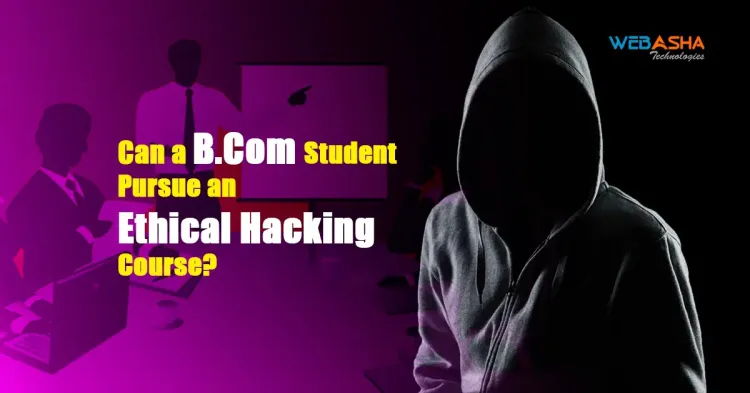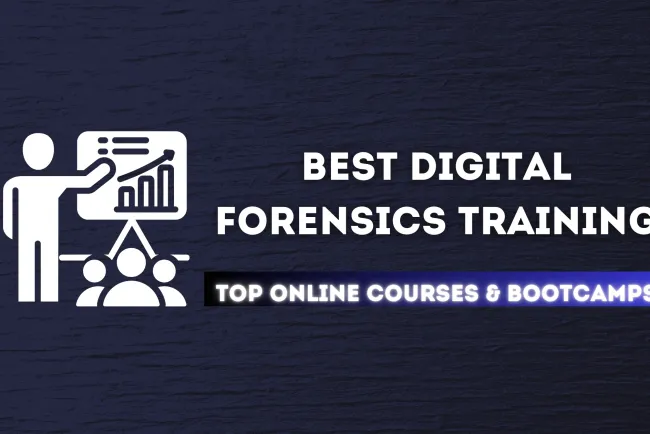Can a B.Com Student Pursue An Ethical Hacking Course?
Wondering if a B.Com student can pursue a career in ethical hacking? Discover how non-technical backgrounds can successfully transition into ethical hacking with the right courses, practical experience, and certifications. Explore the steps to get started in this dynamic field.

Ethical hacking is an exciting and rapidly growing field in cybersecurity. With the increasing demand for skilled professionals to protect systems and data, many students from diverse academic backgrounds are exploring careers in ethical hacking. If you're a B.Com (Bachelor of Commerce) student wondering if you can pursue an ethical hacking course, the answer is yes. Here's why and how you can make this transition smoothly.
Understanding Ethical Hacking
Ethical hacking involves identifying and addressing security vulnerabilities in systems, networks, and applications to protect against malicious attacks. Ethical hackers use the same techniques as cybercriminals but do so with permission and legal authorization to improve security.
Why a B.Com Student Can Pursue Ethical Hacking
Skills Over Background: Ethical hacking focuses on practical skills and knowledge rather than academic background. If you have a keen interest in technology and cybersecurity, you can acquire the necessary skills through dedicated courses and training.
Availability of Training Programs: Numerous institutions and online platforms offer ethical hacking courses designed for beginners, including those without a technical background. These courses often start with the basics and progress to advanced topics.
Industry Relevance: The cybersecurity industry values skills and certifications more than specific academic degrees. If you can demonstrate your expertise and practical experience, your academic background will be less of a concern.
How to Get Started
Enroll in an Ethical Hacking Course: Choose a course that suits your level of expertise. Look for beginner-friendly programs that cover fundamental concepts and tools used in ethical hacking.
Gain Practical Experience: Practice ethical hacking techniques in controlled environments like labs and simulators. Many courses offer hands-on labs to build practical skills.
Obtain Certifications: Pursue industry-recognized certifications such as Certified Ethical Hacker (CEH), CompTIA Security+, or Offensive Security Certified Professional (OSCP) to validate your skills and enhance your employability.
Stay Updated: Cybersecurity is a dynamic field with constant changes. Stay informed about the latest trends, tools, and techniques through continuous learning and professional development.
Prerequisites for Studying Ethical hacking course after B.com
To study ethical hacking in India, there are no specific educational prerequisites or formal degree requirements. However, having a strong foundation in computer science, networking, and information security can be beneficial.
Is B.com student is an advantage for studying Ethical Hacking Course?
Yes, it is.
A B.Com student is beneficial, but further specialized training is needed for ethical hacking.A degree in B.Com can help you develop critical thinking, problem-solving, and analytical skills, which are important for ethical hacking. You will need to be able to analyze complex systems, identify potential vulnerabilities, and develop effective strategies for securing them.
However, it is important to note that ethical hacking involves more than just technical skills. It also requires a deep understanding of ethical and legal issues, as well as a commitment to acting responsibly and ethically. Therefore, while a degree in B.com can be an advantage, it is important to also develop a strong understanding of the ethical and legal issues related to ethical hacking.
Advantages:
Technical Skills: Provides foundational IT knowledge.
Problem-Solving: Develops analytical skills useful in hacking.
System Understanding: Familiarity with computer systems and networks.
Syllabus of the Course
Introduction to Ethical Hacking
Basics, roles, and ethics.
Footprinting and Reconnaissance
Information gathering techniques.
Scanning Networks
Identifying active hosts and open ports.
Vulnerability Analysis
Finding security weaknesses.
System Hacking
Password cracking, privilege escalation.
Malware Threats
Types, detection, and countermeasures.
Sniffing
Network traffic interception.
Social Engineering
Human manipulation techniques.
Denial of Service (DoS)
Attacks and prevention.
Session Hijacking
Exploiting active sessions.
Hacking Web Servers
Web server vulnerabilities.
Hacking Web Applications
SQL injection, XSS.
Wireless Network Hacking
Wi-Fi vulnerabilities.
Cryptography
Basics of encryption and decryption.
Penetration Testing
Real-world hacking simulations
Conclusion
As a B.Com student, you can definitely pursue a career in ethical hacking. Your path will involve enrolling in appropriate courses, gaining practical experience, and obtaining relevant certifications. With dedication and a passion for cybersecurity, you can successfully transition into this exciting and rewarding field.
FAQ
1. Can a B.Com student enroll in an ethical hacking course?
Yes, a B.Com student can pursue an ethical hacking course. The field is open to students from various academic backgrounds, including commerce.
2. Do I need a technical background to succeed in ethical hacking?
While a technical background helps, it’s not mandatory. Many ethical hacking courses start with basics and build up to advanced topics.
3. What skills do I need to start an ethical hacking course?
Basic computer literacy, problem-solving skills, and a keen interest in cybersecurity are helpful. You can acquire technical skills through the course.
4. Are there specific certifications I should aim for?
Yes, certifications like CEH (Certified Ethical Hacker) and CompTIA Security+ are valuable and widely recognized in the industry.
5. How long does it take to become proficient in ethical hacking?
The time varies based on your prior knowledge and dedication. Generally, with focused study and practice, you can gain proficiency in 6-12 months.
6. Will my commerce background affect my job prospects in ethical hacking?
No, employers focus more on your skills and certifications in ethical hacking than your academic background.
7. How can I gain practical experience in ethical hacking?
You can gain practical experience through labs, simulations, internships, and participating in cybersecurity challenges and competitions.












![Top 10 Ethical Hackers in the World [2025]](https://www.webasha.com/blog/uploads/images/202408/image_100x75_66c2f983c207b.webp)

![[2025] Top 100+ VAPT Interview Questions and Answers](https://www.webasha.com/blog/uploads/images/image_100x75_6512b1e4b64f7.jpg)









